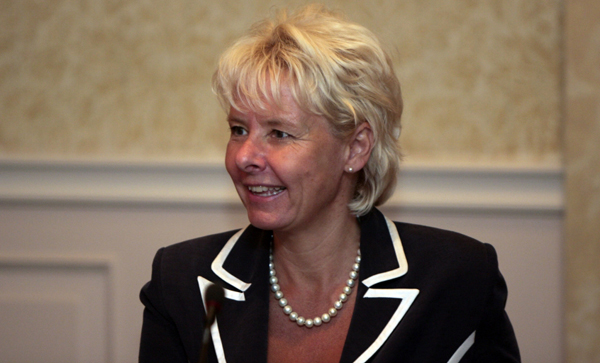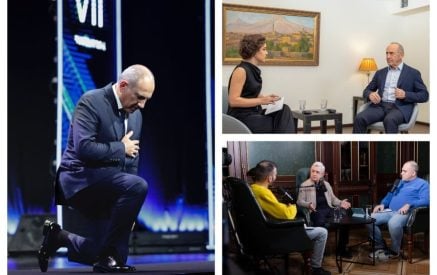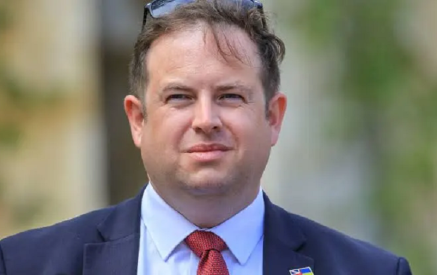The interlocutor of “Aravot” is Terhi Hakala, former Ambassador of Finland to Georgia and Azerbaijan, currently Director General of Department for Russia, Eastern Europe and Central Asia of the Ministry for Foreign Affairs of Finland.
– Ms. Hakala, on November 3, in Helsinki, David Shahnazaryan and Eldar Namazov signed a joint statement on Nagorno-Karabakh conflict settlement, which was supported by the civil society representatives from Armenia and Azerbaijan. The authors of the Statement appealed to the leadership of co-chairs of the OSCE Minsk Group and to all States with urgent demand to stop the supply of all kinds of offensive weapons in the region of Nagorno-Karabakh conflict. We appeal to the political leadership of the parties to the conflict to urgently start a formulation of a Peace Agreement of Nagorno-Karabakh conflict on the basis of the initiative of the co-chair of the OSCE Minsk Group Ambassador James Warlick from May 7, 2014 and the Statement of the OSCE Minsk Group co-chairs from May 12, 2014. Does your country see potentials to facilitate the Nagorno-Karabakh settlement process?
– First, I must say that we are a part of the Minsk process since 90s. In mid -90s, after our co-chairing in the OSCE Minsk Group, we support the Minsk Group process and are willing to support the process and that is why we invited Azerbaijan’s civil society representatives from Armenia and Azerbaijan to Helsinki, then to Mariehamn (Åland Islands), because we see their willingness to assist the OSCE Minsk Group in Karabakh peace process. I think that the civil society, in general, plays a key role in the peace process. Of course, ultimately the government authorities are the ones to make the decision; nevertheless, it is the civil society that supports these decisions. Without the support of civil society, large-scale and long-term solution is not possible. I am happy that Armenians and Azerbaijanis reached agreement in Helsinki, I welcome every step by the civil society, which is aimed at finding ways to the settlement process.
– Despite the fact that Armenia affiliates the Eurasian Union, European officials assure that the EU seeks closer ties with Armenia, and the Armenian authorities also assure that they are ready for a deeper relationship with the EU. To what extent is the Armenia-EU effective interaction possible under Armenia’s affiliation to the Eurasian Union?
Read also
– First of all, I would like to emphasize that the government of your country has made the decision regarding the political course and signed the Treaty of Accession to the Eurasian Union, and we respect this decision. It is the decision made by your sovereign country’s leadership. Indeed, the documents, which must be adopted with the EU, should be adjusted with this decision. But, I think that your country, no doubt, should keep cooperating with the EU and European countries. I do not see any problems. Of course, the nature of this partnership will change, because the EU Association and Free Trade Agreement actually assume partnership of other level. The Eurasian Union membership does not exclude partnership with the EU. If Armenia is a part of the Customs Union, it automatically excludes free trade with the EU. However, EU is ready to develop relations with member states in the framework of the Eastern Partnership policy, and we welcome this partnership and ties with Armenia as much as Armenia is willing to develop relations with the EU.
– Do the Europeans still have confidence in the authorities of our country, given the fact that after three and a half years of negotiations, Armenia’s authorities decided not to sign the EU Association Agreement?
– Why not? As I said, it is the decision of every sovereign country of what agreements they are going to sign. They also have the right to change their position. European Union is in partnership with Armenia a long time ago in the framework of Partnership policy, and we will continue the partnership and develop relationships.
– Ms. Hakala, how do you explain Russia’s actions in the post-Soviet territories? The Russian-Ukrainian tension, which turned into an unprecedented confrontation between the West and Russia, proves that the Russian president is striving to preserve the influence in the region at all costs.
– Absolutely. We do not accept what is happening in Ukraine. The annexation of the Crimea was a move against the international community, against the international law, which we condemn. Therefore, we impose sanctions against Russia. We hope, however, that there is a way out of this situation, that the arrangements for the establishment of peace will be respected. It certainly would be a long way to pass. We, as a neighboring country, hope that it will be possible to reach an agreement and get out of this situation. We all need to work for it to ensure stability in Ukraine. Therefore, returning to the Helsinki meeting of civil society representatives from Armenia and Azerbaijan and their adopted statement, I must say that it was a significant event, in the sense that these politicians are jointly seeking to find a way out regarding the Karabakh peace process.
Emma GABRIELYAN

























































